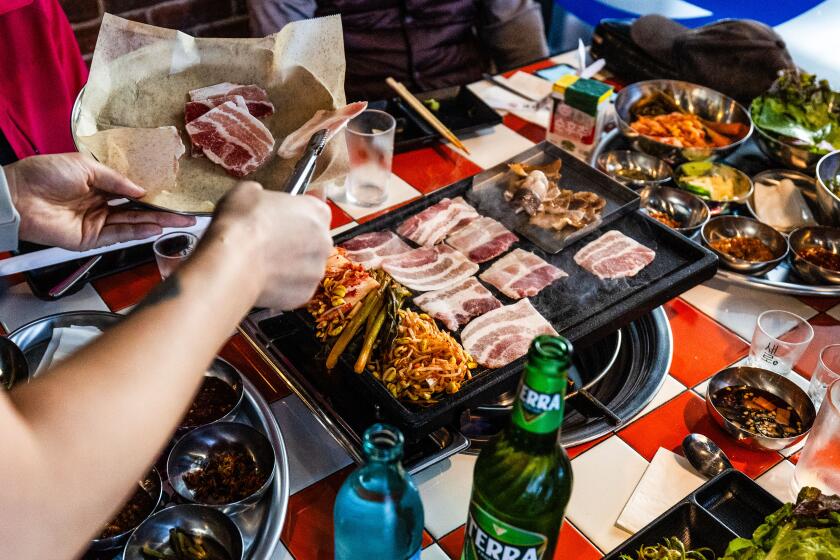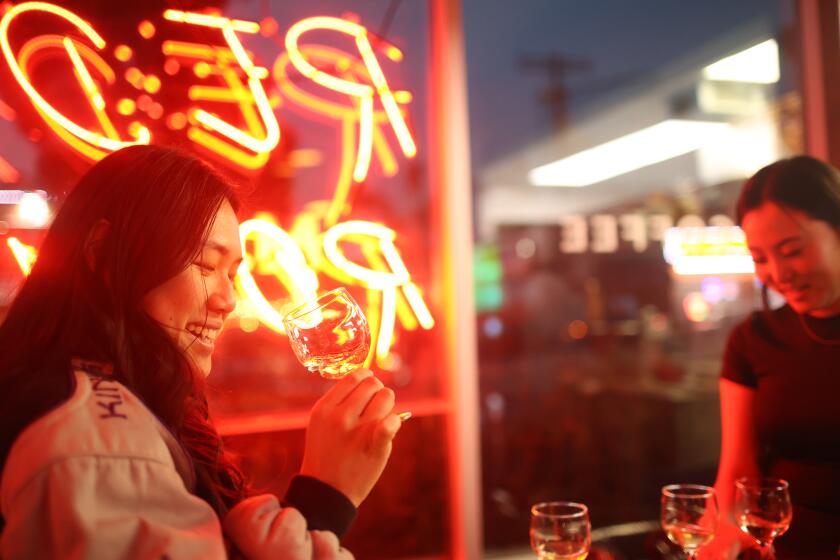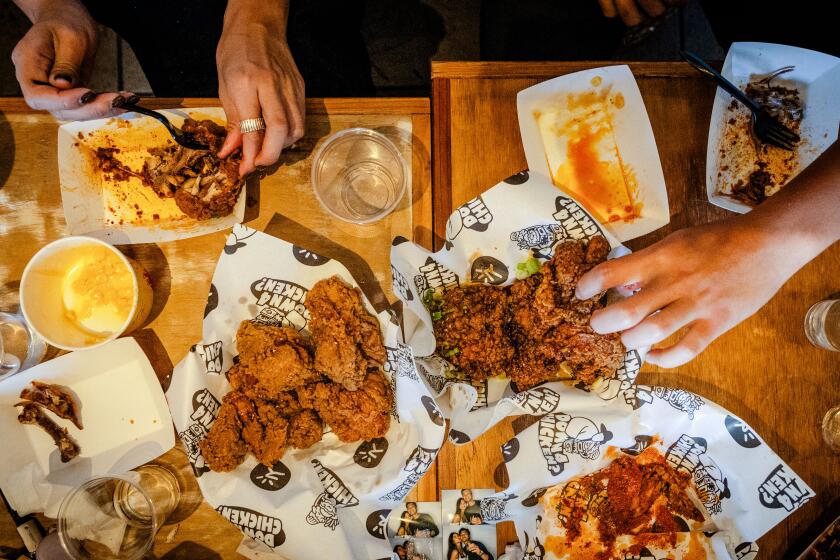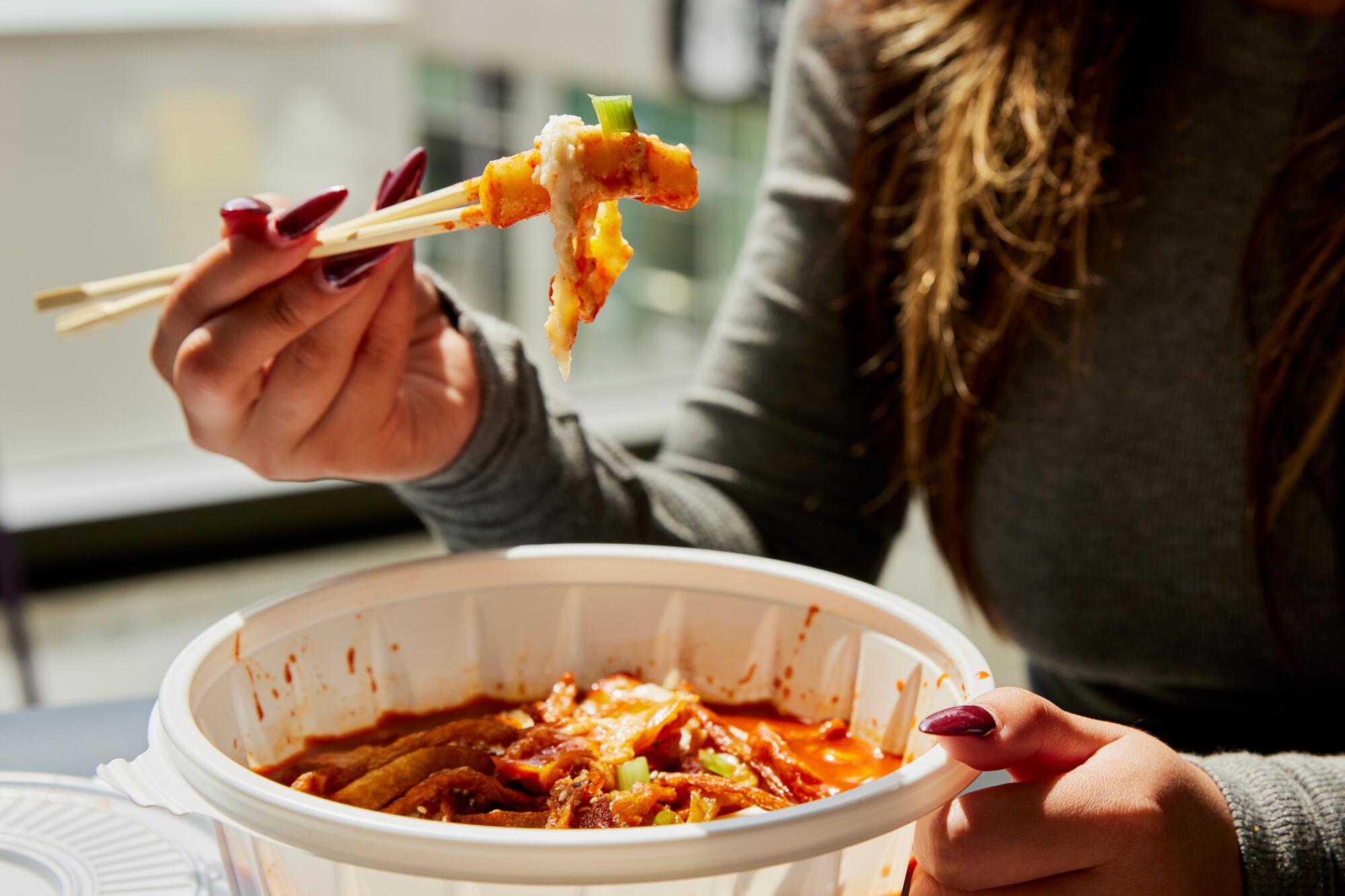
- Share via
From the outside, the Source OC looks like a typical outdoor mall in Southern California with concrete and glass architecture and neon lights. But the entertainment and dining destination offers a unique window into Orange County’s newest, trendiest Koreatown.
On any given weekend, the Source brims with activity. In the center of the first floor, practicing K-pop dance crews show off their moves. Families cluster in the mall’s two food courts. Dispersed across three levels are multiple Korean barbecue restaurants, Korean street food stands and Korean bakeries. Older Korean Americans gravitate to coffee shops such as In-Sit Coffee after Sunday church services. A long staircase at one end of the mall doubles as stadium-style seating, where groups of friends gather to eat and socialize. There are often live performances from K-pop groups like Black Swan and even street karaoke.
Check out our guides to the best Korean barbecue, late-night hangouts, fried chicken and more.
The mall “reminds Korean Americans of home, while at the same time introducing others to the culture,” said Buena Park Mayor Susan Sonne.
In fall 2023, the Buena Park City Council voted unanimously to designate the stretch of Beach Boulevard between Orangethorpe and Rosecrans avenues as Koreatown. The suburban area is home to more than 1,000 small businesses owned by Korean Americans and shopping plazas anchored by grocery stores such as Zion Market, Hannam Chain and H Mart. Signs in Korean are as common as those in English. And other popular Asian concepts, like Taiwanese bakery 85 Degrees and Japanese chain Daiso, have debuted in the neighborhood.
Being a student of Korean foodways is essentially written in my job description as a Los Angeles critic. A visit to New York is showing where a new frontier might be heading.
Korean Americans from Los Angeles began moving to suburbs in Orange County after the 1992 riots. The steady migration contributed to satellite “Koreatowns”; in 2019, the Garden Grove City Council voted to rename the-then 20-year-old Korean Business District as “Orange County Koreatown.” Korean American communities have grown across the county, including in Irvine and Fullerton.
When the Source opened on Beach Boulevard in Buena Park in 2016, the $325-million project from M+D Properties — the same firm behind Lynwood’s Plaza Mexico — became an immediate magnet for the area’s teenagers and families. And like Plaza Mexico, an outdoor mall with facades that replicate classic architecture from Mexico, the Source has become a hub for culture-defining trends.
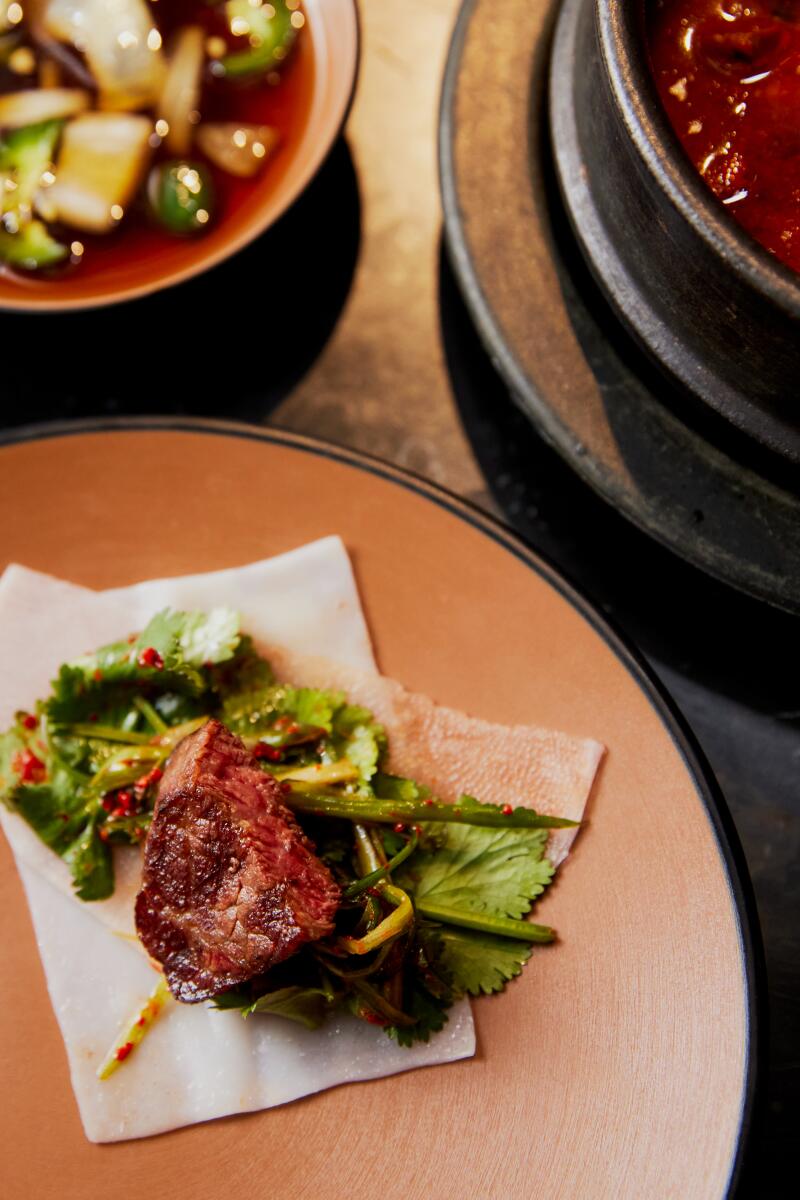
Compose your perfect bite at M Korean barbecue.
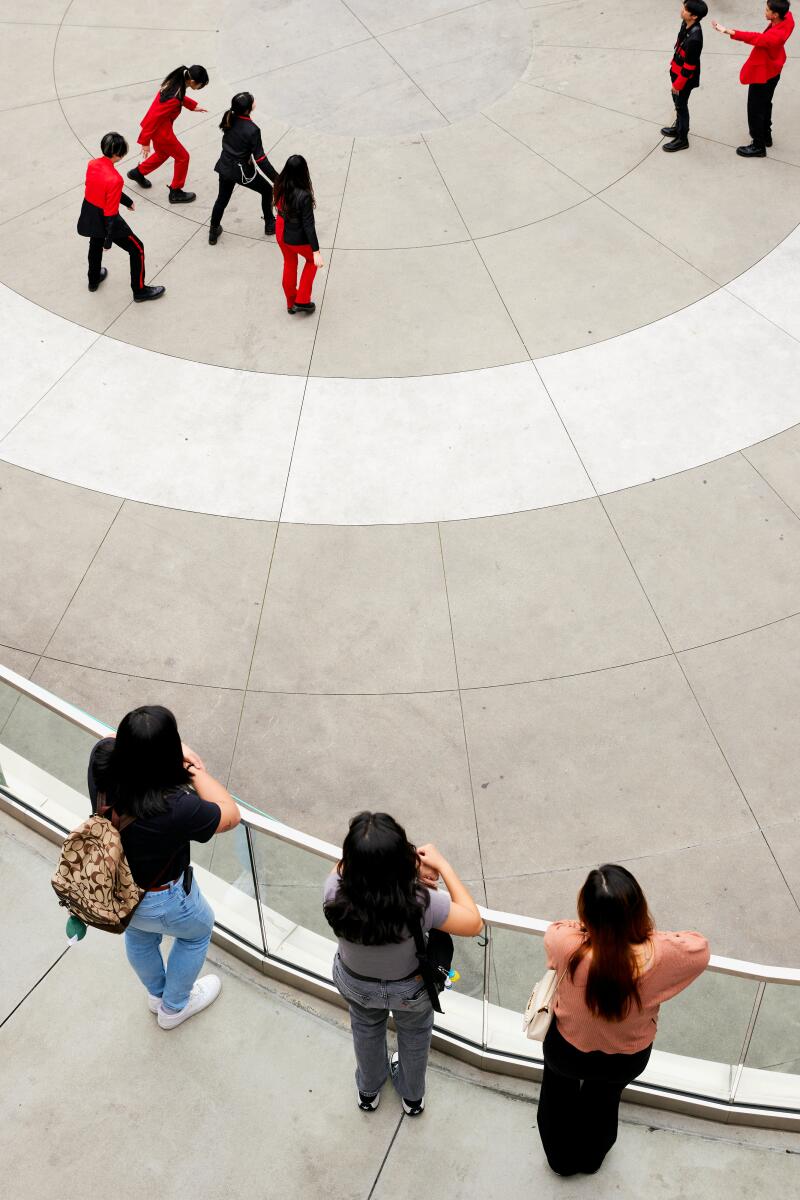
On weekends, mallgoers watch dance crews practice K-pop routines in the open courtyard at the Source.
Located less than three miles from Knott’s Berry Farm, the 500,000-square-foot complex is home to CGV Cinemas, a movie theater specializing in subtitled Korean films; Korean-oriented beauty and retail stores; a karaoke lounge; and K-Pop Center, an entertainment training school offering coaching in K-pop dance and vocal styles.
The Source has also emerged as a nightlife destination, with EKO Karaoke Lounge opening exclusively to a 21-and-older crowd after 9 p.m. and the Ultimate Esport gaming lounge drawing late-night gamers.
“What made me really want to go to the Source was the K-place,” said 15-year-old Malia Cherie. “I am a really huge K-pop fan so I wanted to go to that store to buy albums and merch.”
Cherie, a high school student, first visited the Source in 2019, and said she returns to the mall with her friends about once a month. “We mostly go there to eat,” she said.
Whether you’re looking for an all-you-can-eat feast, galbi galore, a duck specialist or a full-on seafood spread, Koreatown has all the Korean barbecue you could wish for.
The mall is also home to Myungrang Hot Dog, a franchise that serves Korean-style corn dogs. Myungrang started in 2016, inspired by the hot dog carts of Korea and capitalizing on the nostalgia of kids who grew up eating from the carts after school in Korea. Then the snack found viral video fame.
“K-food trends are a byproduct of K-pop,” said Jim Koo, president of the Korean American Chamber of Commerce of Orange County. “K-pop artists make content eating Korean food, so all of a sudden people want to eat that food.”
Cherie acknowledges that mukbang videos, or livestream eating content, highlighting foods like Korean corn dogs, have definitely influenced her.
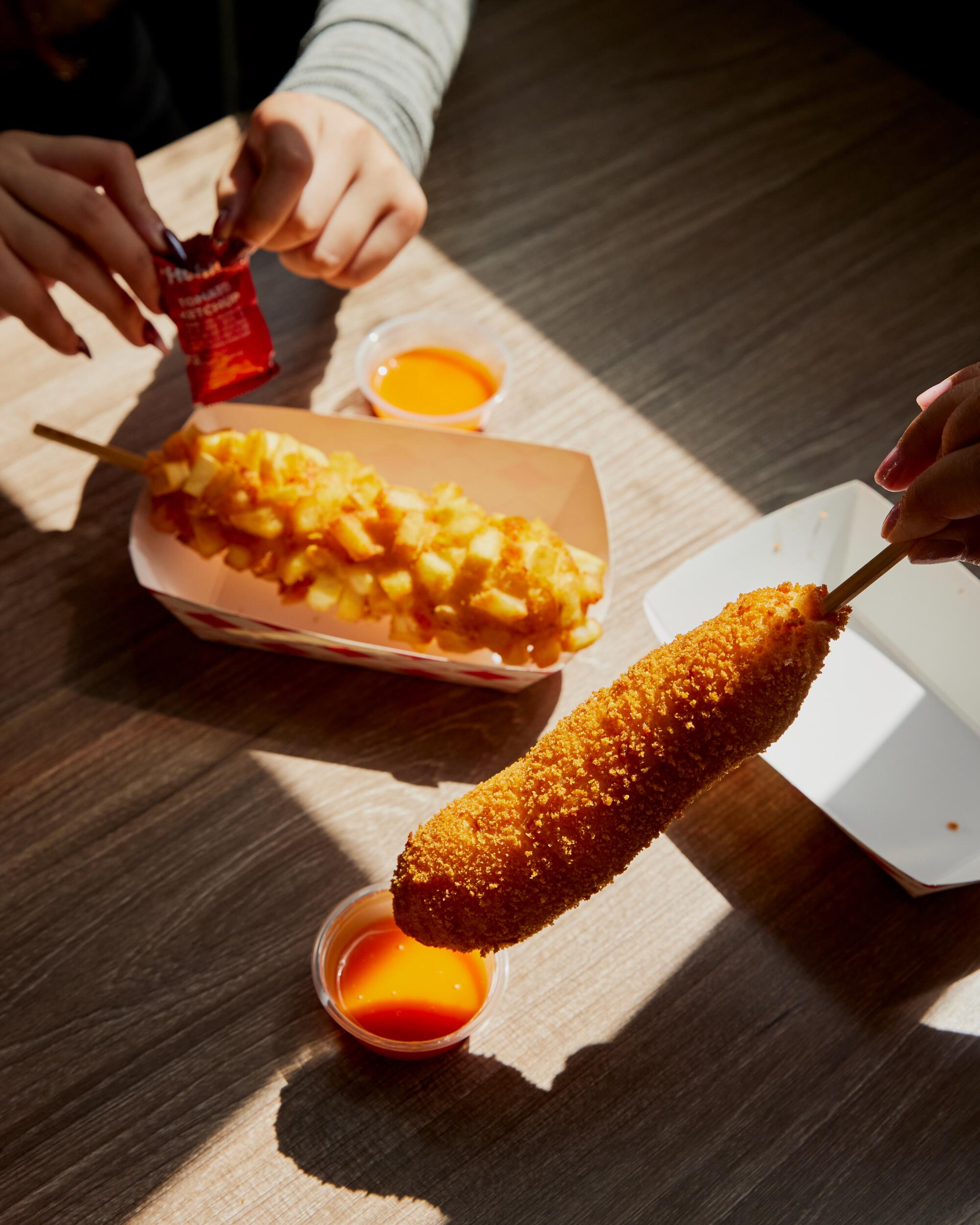
“I am a fan of BTS, and there is a video where they were eating the Myungrang cheesy hot dogs. I really wanted to try it after seeing them eat it,” said Cherie.
The rice-flour-battered cheese and hot dogs are available in different varieties, some with squid ink mixed in the batter, others studded with crispy panko or cubed potato. After being pulled from the fryer, the dogs can be rolled in sugar, dipped in ketchup, mustard and even a sweet cheddar cheese sauce or sweet chile sauce. The rice flour gives the corn dog a chewier, mochi-like texture.
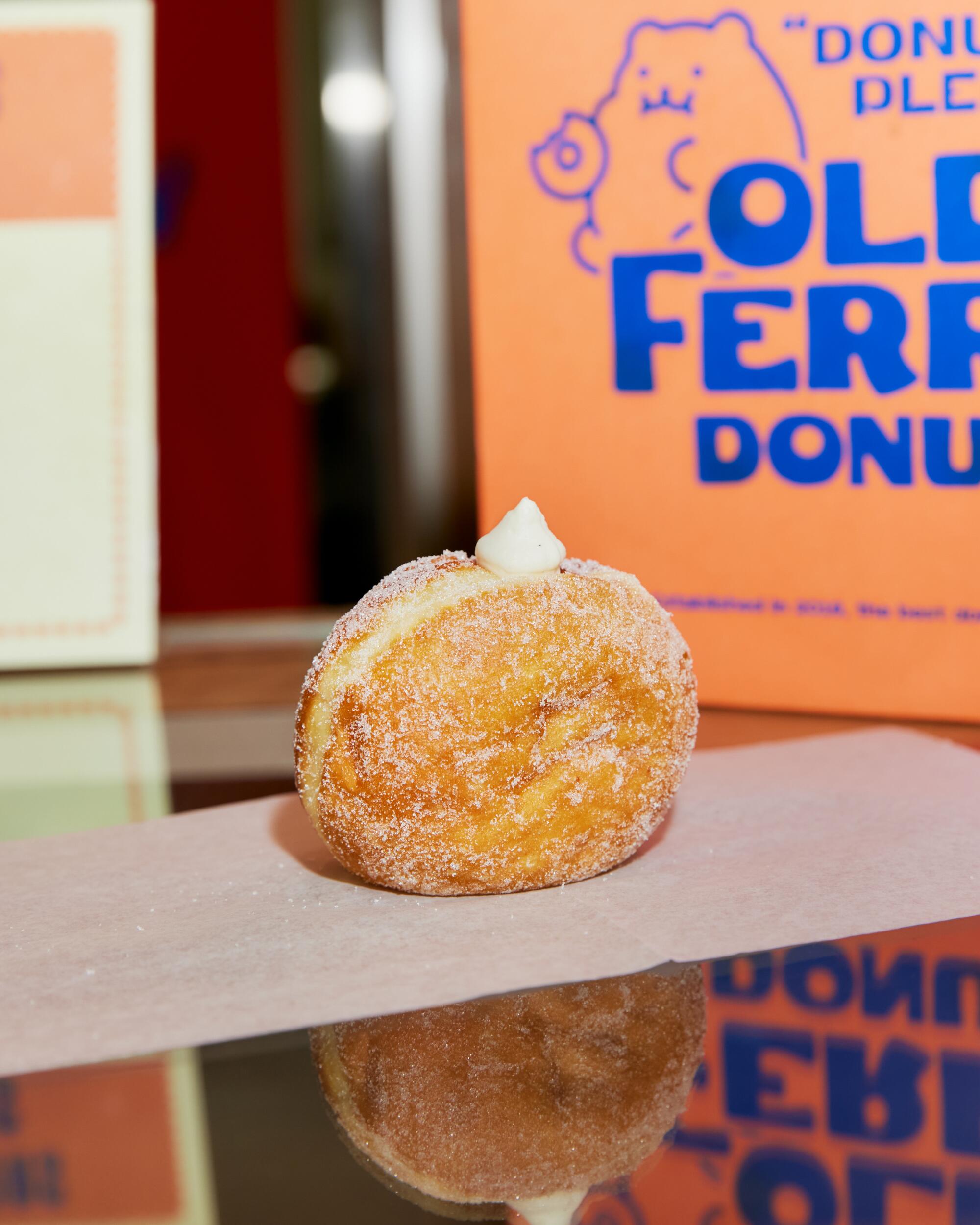
Old Ferry Donut is a filled-doughnut concept established in Seoul in 2016, with 10 locations across South Korea. The first stateside store opened at the Source last year.
“I was so surprised the Orange County Korean community already knew about this brand,” said Hun Hur, corporate manager of Old Ferry Donut.
But according to Koo, the brand recognition makes sense.
“In Buena Park, 25% of the population is Korean American,” Koo said.
From karaoke clubs to wine bars to long-running restaurants with kitchens that stay open late, Koreatown will keep you entertained.
Local awareness of the brand has helped the doughnut shop flourish at the Source. Sought-after flavors include a crème brûlée donut, filled with a rich vanilla custard and topped with brûléed sugar, and a butter pistachio doughnut that’s glazed with butterscotch, topped with crumbled pistachios and filled with a fluffy pistachio pastry cream. Hur said the butter pistachio doughnut was inspired by a pistachio flavor trend in South Korea.
Old Ferry Donut now has locations in Cerritos, Torrance and near L.A.’s Koreatown, with another location in San Gabriel opening soon.
At Jaws Topokki, shoppers can find a menu of Korean street food, also popularized by mukbang videos. Cherie is a fan of tteokbokki, or topokki, a spicy braised rice cake soup topped with cheese. Bite-size slices of gimbap stuffed with bulgogi or tuna are also among the favored menu items.
With delicate, extra-crunchy breading, Korean fried chicken proves one of the most addictive snacks you’ll find in Koreatown.
Across the way, M Korean BBQ serves classic Korean barbecue. Although it isn’t an all-you-can-eat format, the menu offers combos of beef or pork with cuts like pork collar, steak and beef finger rib. A beef combo for two is priced at $78 for example, while a party of three to four is $116.
Misoolkwan, its sister concept next door, opens at 5 p.m. and stays open until 2 a.m. on Fridays and Saturdays. The decor emulates the late-night pubs of Korea, as does the menu serving anju, or classic Korean bar food designed to share, like Korean fried chicken and scallion pancakes.
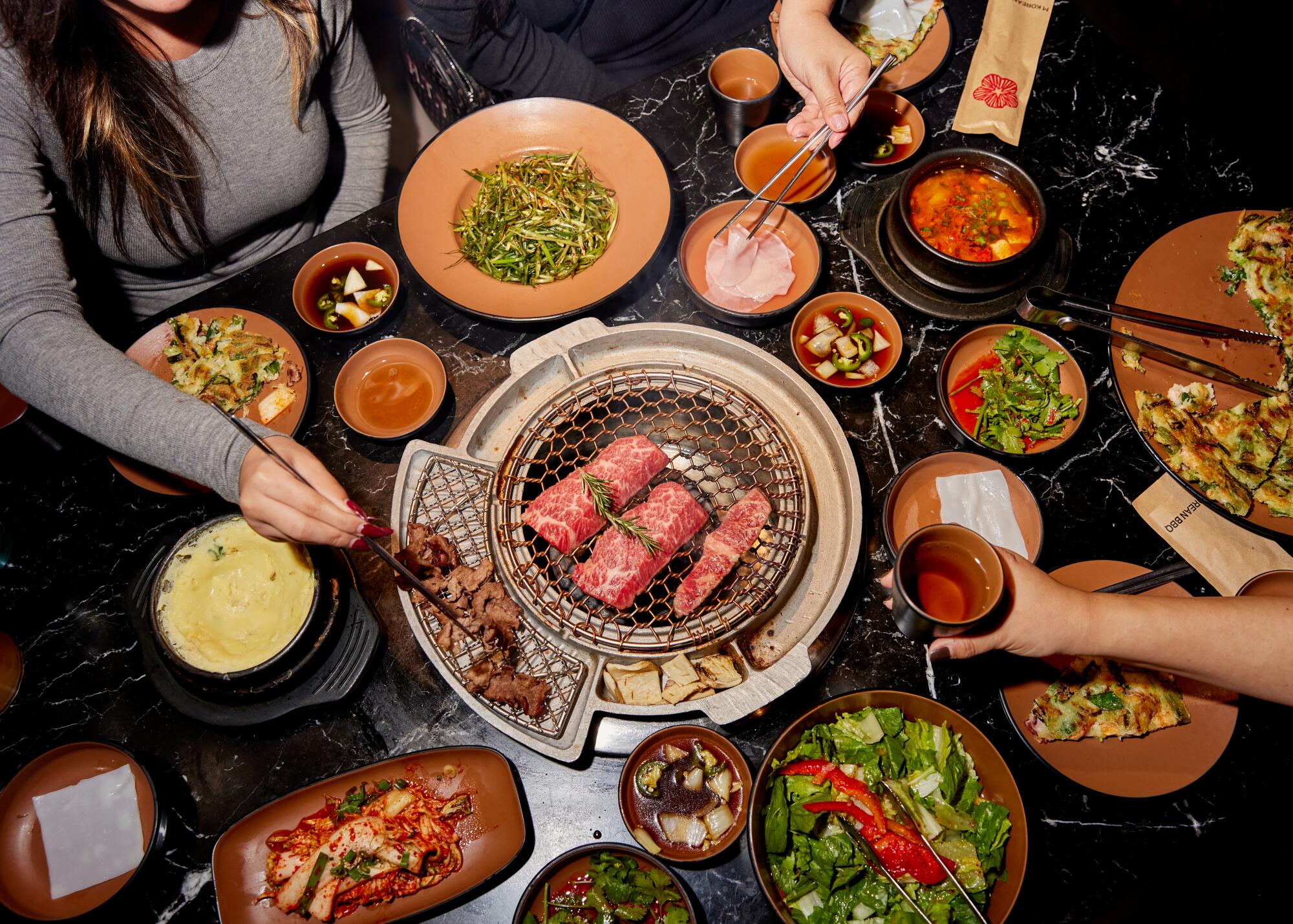
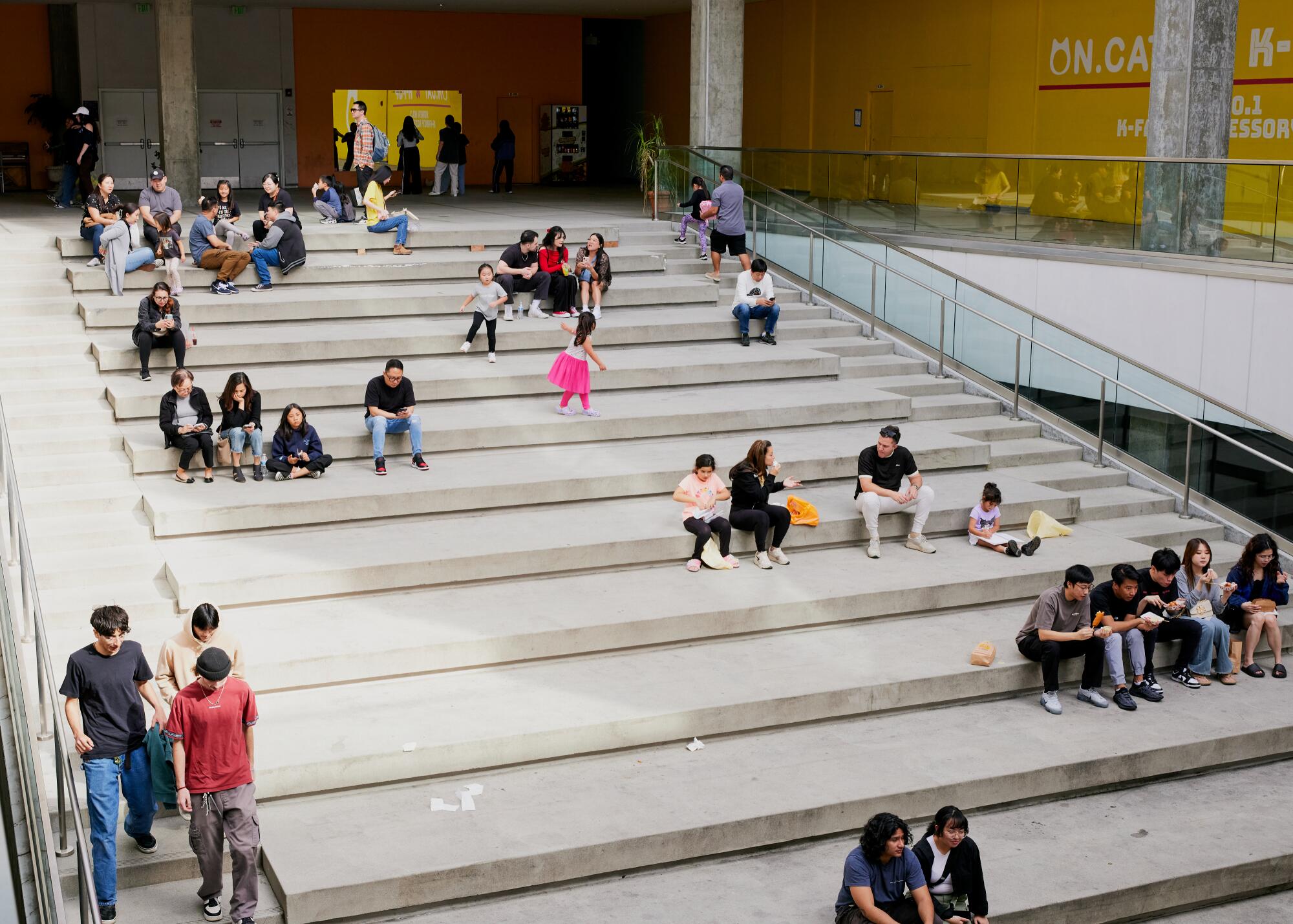
“The Source’s location within a thriving Korean American community and its status as a hub for fast-moving trends make it an exciting place for us to introduce and adapt our culinary innovations,” said Steve Lee, chief executive and president of the Southern California Restaurant Co., which manages M Korean BBQ, Misoolkwan and other Source concepts such as Il Fiora, Orange Blossom, N. Cat and Seoul Tang and Noodle.
Other dining choices include Gannam House Korean Barbecue; Ocean Snack, serving Korean seafood; and Pelicana Chicken, which specializes in Korean fried chicken and pub food. The Bakery has a storefront on the larger third-level food court, but also operates a baking school at the Source. The concept is known for twigim-soboro, or the Gombo doughnut, a deep-fried Korean soboro bun filled with sweet potato or red bean. The pastry first gained hype in Daejeon, South Korea, and has become somewhat of a Korean bakery staple.
And there are more Korean food options on the way.
In April, the Source will welcome well-known Korean fried chicken concept Puradak, in its first U.S. location. The following month, Seed + Water Bakery Cafe & Coffee Roasters will open in a 21,600-square-foot space beneath M Korean BBQ.
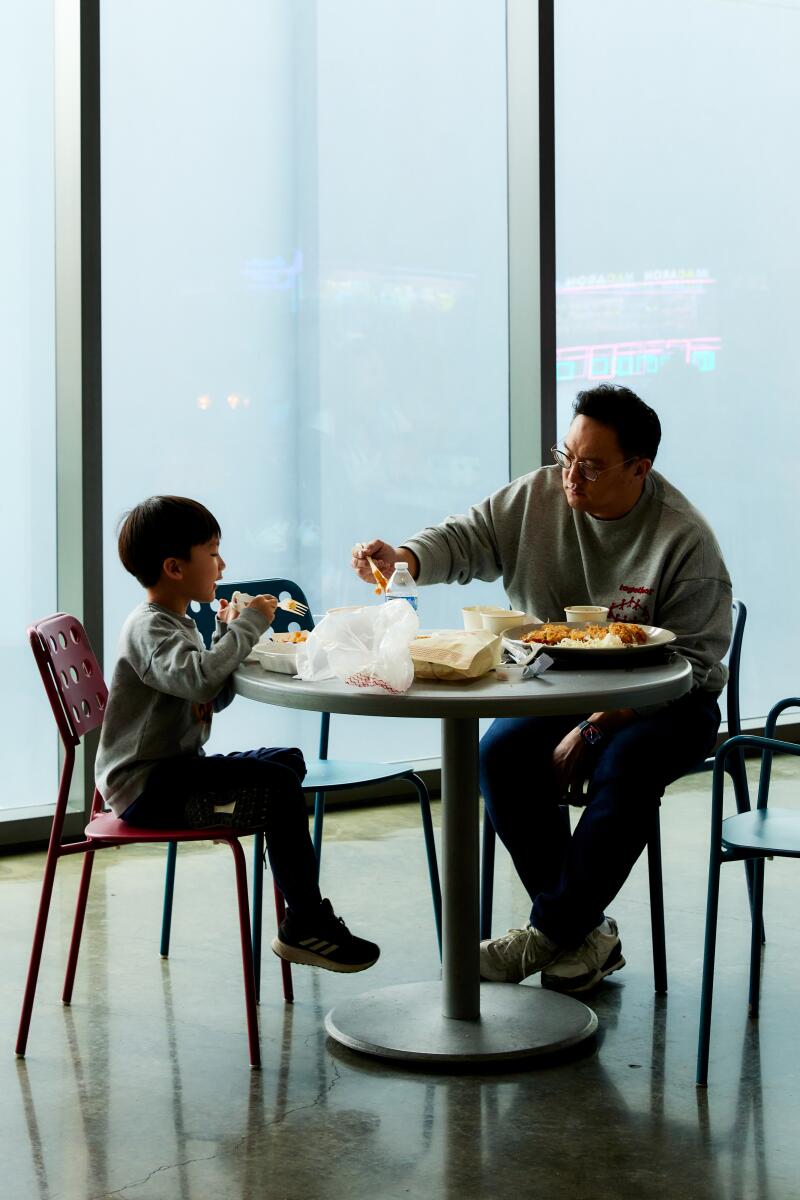
Food options abound at the Source OC, including Korean-style hot dogs, coffee and tea shops, bakeries, Korean barbecue and more.
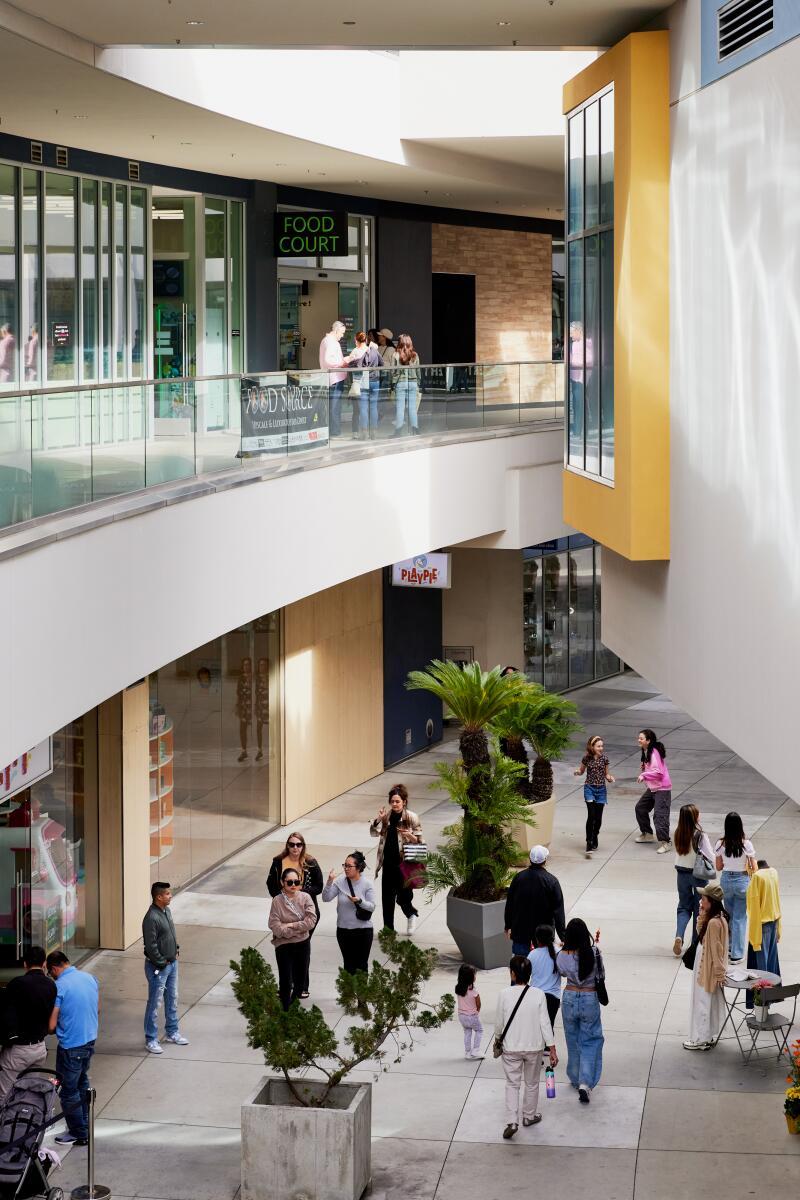
Just a few miles away from Buena Park’s Koreatown, the Source is a top destination for Korean culture in Southern California.
“The Source still has open spaces and a lot of businesses wanting to come here. I hope this mall will continue to grow,” Koo said.
Before the Source opened, the intersection of Beach Boulevard and Malvern Avenue in Buena Park served as the center for Korean businesses in North Orange County. There, locals and out-of-town visitors could find restaurants such as BCD Tofu House and Korean grocery stores like H Mart.
“I think two different generations are attracted to the two different places,” said Koo. “The older generation probably enjoys Koreatown compared to the Source.”
Regardless of how the demographics are split, even long-running restaurants are noticing an uptick in business thanks to new crowds flocking to both the Source and Koreatown.
“Buena Park being such a Korean-influenced community and within the past year being designated as the Koreatown of Orange County, it is an important location for us,” said chef Samuel Kim, senior director of culinary operations of Baekjeong Korean Barbecue, on the brand’s Buena Park outpost.
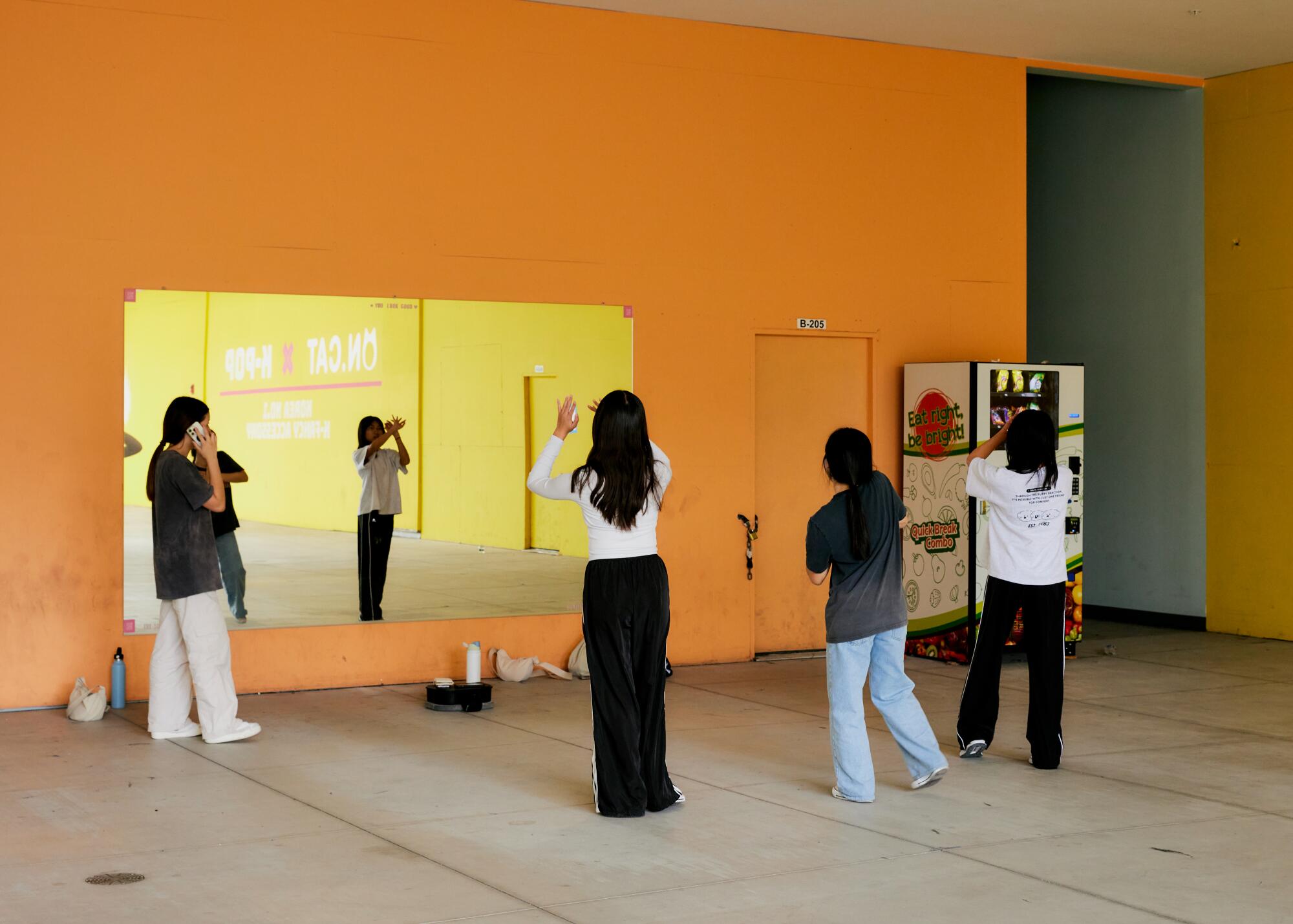
Baekjeong was one of the earliest concepts to bring classic Korean barbecue to the mainstream and many of the popular KBBQ concepts of today have adopted standards set by Baekjeong’s style. When The Times first wrote about the now temporarily closed Los Angeles location in 2012, Baekjeong was drawing two-hour wait times.
A few miles away, the Source continues to be on the forefront of modern Korean American culture. This summer the mall will host D-Festa, an interactive K-pop experience with a virtual stage, performance films and art exhibits featuring nine K-pop groups.
While Cherie has visited other Asian shopping centers, she said there aren’t many places geared toward her and her friends, in Orange County or elsewhere.
“Rowland Heights has a lot of food and Asian shopping centers,” said Cherie. “But there is nothing like the Source.”
More to Read
Eat your way across L.A.
Get our weekly Tasting Notes newsletter for reviews, news and more.
You may occasionally receive promotional content from the Los Angeles Times.


